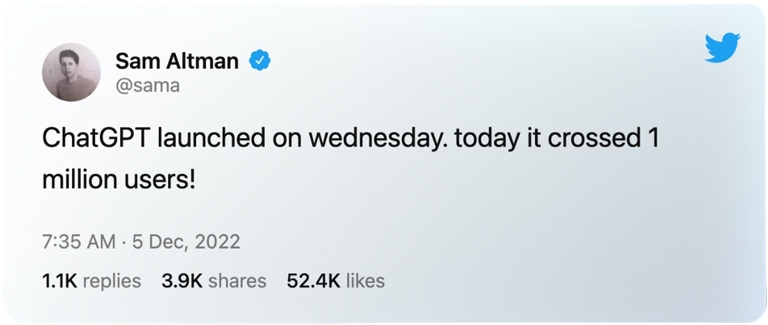Not long ago, Artificial Intelligence was nothing more than a favorite topic of sci-fi authors and Hollywood screenwriters.
But since we’ve all been inundated by the same lines of thinking on social media and in news headlines. “One day, AI will take over the world.” “AI is going to take over all our jobs.”
Now cut to 2023: AI allows you to translate anything from your imagination into images and text.
While everyone’s asking what comes next: Is it Virtual Reality? Is it Augmented Reality? Autonomous vehicles? Crypto? Web3? I think it’s safe to say that Generative AI is the most exciting development since the rise of mobile and cloud.

In only one month, Generative AI was more than a little busy:
And if you’ve spent any time on LinkedIn lately, you’ve no doubt seen a barrage of carousels on ChatGPT for “creating a job description” “writing personalized emails to candidates,”. The list goes on…
They all claim that AI can supercharge HR, with less headcount. So, while the jury is still out on whether Generative AI will make us all redundant or make our lives easier — one huge question still remains:
Will AI matter to us in the world of HR?
Well, the long and short of it is: Yes, it absolutely will.
IDC's Future of Work study predicted that in 2023, 60% of big businesses worldwide would use AI-powered tools to support the complete employee lifecycle experience, and by 2024, 80% will use AI/ML for hiring, firing, and training.
A few years back, there was even a story about Amazon using algorithms to fire people! Talk about not using your superpowers for good 🤷
Another survey by Eightfold showed that 78% of HR leaders were already using AI across essential HR functions like employee records management and 43% planned to use AI for performance management.
And get this, 92% of these leaders say they’ll use AI even more in the future 🤯
But, it wasn’t always this way…
Traditionally, HR was a “paper-pusher” function, with limited emphasis on data-driven decision-making. The hiring process, performance reviews, and offer decisions all rely heavily on manual effort.
Software for HR was bought as an after-thought if any budget remained after meeting the demands of Marketing or Sales (...or any other GTM function).
The pandemic, remote work, the creator economy, and trends like "The Great Resignation" and "Quiet Quitting" shifted power to people — leaving organizations to reevaluate priorities.
AKA, HR had to catch up to the evolving market and the needs of its most important asset: Its People.
Cut to 2023, Human Resources has a big seat at the table, and executives prioritize improving performance and engagement outcomes. Data-backed performance review process is the need of the hour.
Efficient and sophisticated software is necessary to meet these changing demands. And AI is more than up for the job.
And now for your reading pleasure, here's a recap of HR and AI’s shared history so far ❤️
In 2021, Amber became the first employee experience platform ever to be powered by GPT-3. No biggie, just another day in the life of a Chief Listening Officer. 😉 💪
The collaboration between AI and HR is STILL in its honeymoon phase, and I’m honestly super excited to see “where this goes…”, especially with the hottest new entrant to this mix…
🥁GPT-4
Let's talk about GPT, shall we?
This baby is a powerhouse for getting things done, especially the latest version — GPT-4. It has applications across the entire employee journey from finding the right candidate to saying goodbye when they move on to greener pastures. It’s literally a Swiss Army Knife for HR profs.
But, before we get all excited about its endless possibilities, let's take a step back and make sure we're protected from its risks. Safety first, people leaders!
Even though ChatGPT is pretty amazing, it's still incredibly new and untested. Very recently, Samsung exposed itself to risk after employees shared confidential information via ChatGPT prompts. Obviously, there are opportunities and there are risks. And we’d be wise to consider them both.
So, I had a chat with Varun Puri — Chief Product Officer at inFeedo — and we came up with the 7 Key Points to remember when using this cutting-edge technology:
That's it for today! 😅
In the next edition, I'll dive into 7 use cases for GPT that have the potential to change the way HR functions — for the better.